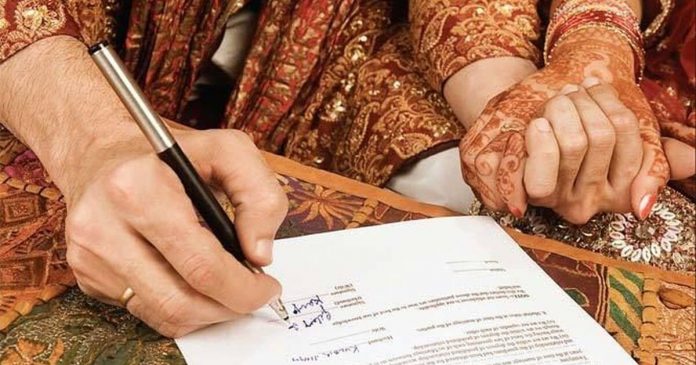This article has been written by Oishika Banerji, from Amity Law School, Amity University Kolkata. This article deals with the fact that whether registration of marriages is mandatory in India or not.
Table of Contents
Introduction
Marriage in India is referred to as a holy, religious activity which confers individual rights upon both the male and the female involved in the marriage. The fact of whether marriage is a sacrament or a contract has received a large amount of discussion and debates. The Hindu Marriage Act, 1955 expressly associates marriage with that of ceremonies under Section 7 of the Act. Section 7(2) of the Act says that it is the ceremony of saptapadi that involves the bride and groom to take seven steps around the sacred fire jointly that makes the marriage complete. The Hindu Marriage Act, 1955 is applicable to all Hindus inclusive of Buddhist, Jaina or Sikh and excludes Muslim, Christian, Parsi or Jew.
These groups of people are included under the ambit of the Act if the person has been proved to be being governed by the Hindu Law. On the contrary, the Special Marriage Act, 1954, that governs the marriage of Indian nationals in foreign countries without any religious barriers, categorises marriage under the same to be a civil contract by nature. Nevertheless, the debates on this regard will always be present. There are a lot of factors attached with that of registration of marriage. Registration at times has proven to be helpful whereas there are times when registration has not played a major role in the marriage.
Several judgements have been passed concerning registration of marriage. Section 8 of the Hindu Marriage Act, 1955 lays down the provision for registration of the Hindu marriages. It is thus advised by every legal practitioner that as the consequences of not registering marriages in India are not very friendly, it is preferable to register the marriage so as to safeguard the same with the help of legislations associated with it.
 Is it mandatory to register marriage in India
Is it mandatory to register marriage in India
India is a diverse nation being the residence for several religions and groups. Each of them is governed by their own rules and regulations. Further, while the Constitution of India was being framed by our forefathers, they intended to not discuss the very topic of marriage for it was a sensitive issue for the country and its people. Before entering into the very domain of the necessity of registration and the mandatoriness associated with the same, let us first be aware of the fact as to what registration actually is. Section 8 of the Hindu Marriage Act, 1955 lays down the element of registration in a Hindu marriage even though it does not make the provision compulsory for parties in a marriage. The section provides five subsections which are elaborated in simple terms below:
- Section 8(1) says that as a proof of the Hindu marriages, the State Governments will be granted authorities to make rules which will provide that the parties involved in the marriage have been so in terms with the conditions that are provided by the Hindu marriage Register and along with this the documents that are associated with the marriage should also be kept with the parties for future references.
- Section 8(2) provides that it is the responsibility on the part of the State Governments to ensure that the parties to the marriage have abided with the rules that have been provided in Section 8(1) and if there are any signs of contravention by the parties, then it is the State who will charge a fine of twenty-five rupees from the parties.
- Section 8(3) says that the rules that have been talked about in Section 8(1) should be provided to the State Legislatures after their formation.
- Section 8(4) lays down the duty of the Hindu Marriage Register that is to inspect the marriage in order to have sufficient evidence as to the marriage concerned to prove it to be legal.
- Section 8(5) summarises the fact that the validity of the Section will not be affected in any way if the registration of a Hindu marriage does not take place in the course.
For the registration to take place successfully, the presence of both parties associated with the marriage needs to be present. It was in the case of Nishana Mol v. Alappuzha Municipality that the court held that if the registrar of the marriage concerned is hesitant or doubtful about the identities of either one of the parties in the marriage, only then can the registration of marriage take place and will amount to be necessary.
Registration of marriage binds the marriage with all the associated legislatures, in simpler terms the legality of the marriage is determined by its registration. Registration is also a means of protecting the parties in the marriage. The fact that India has been long driven by the patriarchal society with the supremacy of men in every social aspect, cannot be ignored. Subjecting women to feudality, harassment both mental and physical and several other social issues have been the object of marriage in India. If marriage is traditionally viewed, the purpose of marriage is the procreation of children and satisfying the groom as and when he wants.
Although all these grounds can be viewed to be vague and useless while talking about registration, these are the actual reasons for having a provision for registration in India. Compulsory Registration of Marriage Bill, 2005 was brought about by the Central Government taking into view the necessity for the people of this country to be aware of the social structure and related legislations. The Law Commissioner of India also came up with the suggestion of linking the registration of marriage with that of the Aadhaar identification in order to ensure traceability universally. For the protection of both the parties in the marriage, providing identification to the marriage is necessary that is guaranteed by the registration of the same. This move by the government was welcoming for a lot of communities while many opposed the same.
Discussion as to the usage of The Registration of Births and Deaths (Amendment) Bill, 2012 for the marriage solemnization between two individuals of any religion whatsoever also took place. This bill would have provided women with support if they came across maintenance cases for a certificate of registration has a great value. The marriages that were already registered under the Anand Marriage Act,1909 which is meant for the registration of Sikh marriages were exceptions of the bill. But these discussions came to an end when the fact that unless the government itself makes the registration of marriage compulsory and makes the same access to every citizen across the nation, it was difficult to establish registration to be compulsory for all marriages, arose.
Taking into view the conditions of women who are suffering from their married life because of ill habits of husbands, marital distress etc the Supreme Court ruled out that irrespective of any religion the parties to marriage belong, the registration for any marriage will be held to be mandatory and compulsory in nature. The apex court also took to view that until respective State Governments will be able to promulgate separate legislations or bring in satisfying amendments in the existing registration, the rule passed by the court is to be followed without any kind of unnecessary hesitations.
The requirements for registration of marriage in India
In India, the two legislation that governs marriages are:
- The Hindu Marriage Act, 1955
- The Special Marriage Act, 1954
The registration procedure is inclusive of certain requirements that the party should carry on which are provided below:
- The application form concerning the registration for marriage needs to be provided to the sub-divisional magistrate provided the same is inclusive of the initials of both the parties.
- Documentary evidence in the form of birth certificate, passport, matriculation certificate is required to be presented by both the parties.
- At the time of registering the marriage in a court of law, both the parties should have an age of 21 years for it is the minimum limit of valid age that should be acquired to be married legally.
- Passport size photographs of both the parties need to be provided as well.
- If the parties are supposed to be registered under the Special Marriage Act, 1954, documentary evidence regarding the place of residence for the parties are required.
- Deposition of fees is also required to the Register for the registration of the marriage. An amount of Rs. 100 needs to be provided in case the marriage is about to be registered under The Hindu Marriage Act, 1955 whereas an amount of Rs 150 needs to be deposited if the marriage is to be registered under the Special Marriages Act, 1954.
The registration of the application of the marriage should be carried out within a period of 15 days of the marriage solemnization. This was observed in the case of P. Remesh Kumar v. Secy.,Kannapuram Grama Panchayat. A thing that needs to be kept in notice that not many people are aware of the requirements as provided above which are necessary for the registration of their marriage. It often happens the role of the woman in a marriage is modest compared to that of the husband. Thus the process of registration is hindered by convergent misogynistic thoughts.
Landmark judgments
In the famous case of Seema v. Ashwani Kumar, the Supreme Court was with the observation that the subject-matter of registration of marriage is supposed to be considered under the ambit of vital statistics as has been laid down in Entry 30, List-3, Section 7 of the Constitution of India. That is the reason, registration of marriages of citizens all across the nation of any religion under any statute should be held to be compulsory if the State solemnizes the marriage. Thus the judiciary through this case gave a nod to the legislature to make registration compulsory for marriages taking place in the country.
The necessity of registration became mandatory for the citizens. Through this case, the apex court provided direction to all State and Union Territories of the nation to file reports of compliance if any. Some states like Rajasthan, Sikkim, Karnataka, Bihar, Chattisgarh, Goa, Madhya Pradesh, Mizoram were silent with this direction of the court and the States that agreed restricted the filing of compliance only to that of the Hindus. The court also guaranteed a period of 3 months for the filing of the compliance.
Further, in the case of Pranav A.M. v. Secy Engandiyum Gram Panchayat, the court provided that if the marriage between two individuals has taken place after conversion of one individual into Hinduism then the registrar of the marriage has no rights to inspect the same. He or she has to simply do her job of registering the marriage.
The case of Valsemma v. Cochin Units had raised the question as to the validity of the registration in a marriage. In this case, the court made the observation that registration of any marriage will be declared as null and void if the ceremonies of the marriage did not take place. This judgement was passed in the year of 1996 focusing on the societal framework of the nation. Such judgments were all overturned in the case of Seema v. Ashwani Kumar, the judgment of which was indeed welcoming for the entire country.
Consequences of not registering marriages in India
Not registering a marriage is a loss for the parties involved in the marriage themselves. Registration makes the marriage legal and recognised in the eyes of law. Societal issues which are more common in affecting the woman includes:
- Child marriage
- Marital rape
- Domestic violence
- Harassments and the list is endless.
Until and unless the marriage between two parties is registered, the parties cannot access the legal rights that are associated with the marriage. As registration is a compulsory element in a marriage in the current scenario, there are certain penalties that are attached to the contravention of this element. Some of them are:
- Penalties for destruction or alteration of Register imposes a fee of Rs. 5000 along with imprisonment for a term of five years.
- Penalties for being dishonest in the memorandum to involve a fine of Rs. 5000 and imprisonment for 2 months.
- Additional penalties can be imposed taking into concern the situation.
Conclusion
It’s true that registration of marriage in India is mandatory and it will be feasible if the same is adopted and followed by the Indian citizen for societal betterment and benefit. Rights which are available should be adopted for those meant for the safeguard of the citizens only.
References
- https://legaldesk.com/marriage/compulsory-registration-marriage-in-india
- https://www.weddingsutra.com/blog/heres-need-register-marriage-india/
- https://www.shareyouressays.com/knowledge/what-are-the-main-consequences-of-registration-or-non-registration-of-marriages-under-hindu-marriage-act-1955/117352
- http://www.legalserviceindia.com/helpline/marriage_reg.htm
- https://scroll.in/article/843571/should-marriage-registration-be-mandatory-only-if-the-process-is-simplified-say-couples
LawSikho has created a telegram group for exchanging legal knowledge, referrals and various opportunities. You can click on this link and join:
 Serato DJ Crack 2025Serato DJ PRO Crack
Serato DJ Crack 2025Serato DJ PRO Crack










 Allow notifications
Allow notifications


